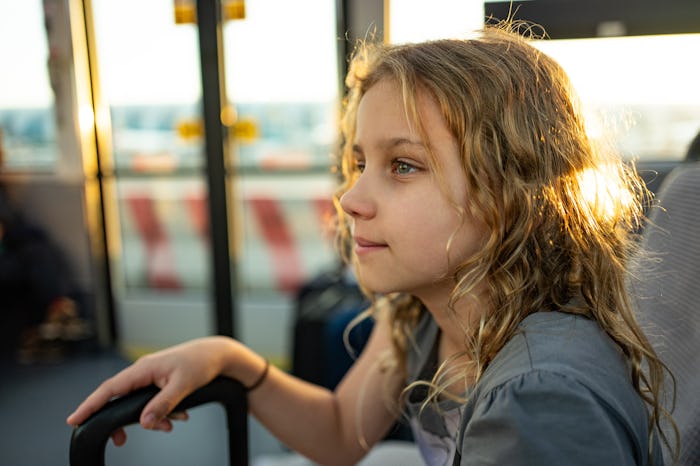Life

Here's What You Need To Know Before Donating Your Old Luggage To Foster Care
So you finally got that fancy new luggage set from Away for Christmas. Score. But with spring cleaning season approaching, what should you do with your used suitcases? If you have pre-loved luggage that’s still in good shape, consider donating your suitcases to foster care organizations in your area. Turns out, kiddos moving into foster homes could put them to great use.
In January, a Facebook post about donating suitcases to foster care organizations went viral. The post describes how children who are going into foster care often end up packing their clothes and belongings in a trash bag, which is hard on their self-esteem in an already complicated situation. You can imagine how this happens, but do foster orgs really want your old duffels and backpacks?
Steven Macias, donor relations manager at Together We Rise, tells Romper in an interview that this is a real issue. Their Sweet Cases initiative donates duffel bags of overnight necessities and comfort items to kids and teens entering care.
“It is true that youth in foster care are often required to pack and carry their personal belongings in garbage bags when navigating through the foster care system,” he says. “Entering the foster care system can be an extremely traumatic experience for a young child or teen. In addition to being removed from their biological parents or family, they’re often required to quickly pack their personal belongings in one or two trash bags. In these moments, it’s important to maintain a child's sense of dignity and self-worth, and also provide them with a reliable form of transportation for their items.”
“I remember saying to my sister before, ‘Man I would really love to do something one day where every kid coming into care has a duffel bag,’” says Amanda Nowlin, family service counselor and adoption specialist at National Youth Advocate Program, in an interview with Romper. “Here’s a duffel bag that’s yours to keep. You don’t have to give it back, and if you move you can take it with you. A lot of these kids are removed so quickly they often don’t get to pack a lot of their own things.”
Nowlin works directly with children and foster families to find them foster placements and forever homes. She has seen firsthand that these children don’t always have long-lasting bags to help them get from place to place. She has taken bins from her office in the past to help them move, and has seen her fair share of trash bags.
“I think this is the biggest thing to note: every situation is different. In one situation specifically, a foster parent was asking for a child to be removed and placed in another home due to behaviors she could no longer handle, and she said she wanted her out that day. When she was picked up to move, all of her belongings were in trash bags. I didn’t specifically ask the child how it made her feel, but I was furious. She came into care with nothing just because of her specific situation; there was nothing in her home to take.”
Both Nowlin and Macias say if you have lightly used luggage to donate locally, call ahead to a few organizations to see who has a need for it, and the space to store it. If you don’t have luggage on-hand but want to contribute, look for orgs like Together We Rise to donate.
“If you wish to find an organization to donate luggage, we recommend doing a quick online search of local agencies or shelters in your area,” says Macias. “However, please remember to call ahead to ensure they can accept your donation. It’s always best to call the agency ahead of time to ensure there is a need and to confirm their storage capacity.”
Nowlin says even if they don’t have room, most agencies will find a way to get donations into the hands of kids who need them.
“Everyone’s first thought is to donate all their stuff to Goodwill, which isn’t a bad thing, but to know those agencies are available to take your things is great. If we didn’t have space, we would give it straight to the kids rather than hold on to it. There isn’t typically a reason we would turn donations away. Right this second, we may not have a home or a place to put it, but we’re going to make it work.”
If you decide to donate your suitcase locally, she says packing it with a few overnight essentials, like toothpaste, a toothbrush, and a teddy bear, is always welcome.
Experts:
Amanda Nowlin, MSW, CWCM, National Youth Advocate Program family service counselor and adoption specialist
Steven Macias, donor relations manager at Together We Rise